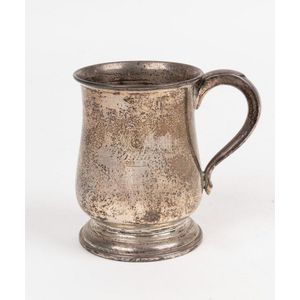Thomas Stokes & Sons Sterling Silver Tankard, Melbourne, 20th Century
A sterling silver tankard by Thomas Stokes & Sons, Melbourne, early 20th century, the classic baluster shaped tankard with a waisted foot and scroll handle, with later engraving 'J.R.G.C. 1950', 4.53 in. high, 240gms silver weight
You must be a subscriber, and be logged in to view price and dealer details.
Register Now to view actual auction price for this item.
- Engraving - The method of decorating or creating inscriptions on silver and other metal objects by marking the surface with a sharp instrument such as a diamond point or rotating cutting wheel.
- Sterling Silver - Sterling silver is a mixture of 92.5% pure silver and 7.5% of another metal, usually copper. Fine silver is 99.9% pure silver, and is relatively soft and the addition of the very small amount of copper gives the metal enough strength and hardness to be worked into jewellery, decorative and household objects.
- Tankard - A tankard is a drinking vessel for beer, ale, and cider, similar in shape to a large mug, and usually with a hinged lid. Silver tankards were in use in Britain and other parts of Europe from at least the sixteenth century, pewter tankards probably from the thirteenth. In the 19th century a number of ornately carved ivory tankards were produced, but these were designed to demonstrate the skill of the carver, rather than for day to day use. The shapes of tankards vary, sometimes globular, sometimes a tapering concave. For those with lids, the lid usually includes a thumbpiece that the drinker can hold down to keep the lid open. Variation in the design of the thumbpiece include wedge, ball and wedge, ball, hammer head, bud and wedge, double volute (scroll), chair-back, ball and bar, shell, double acorn, corkscrew, and ram's horn.
This item has been included into following indexes:
